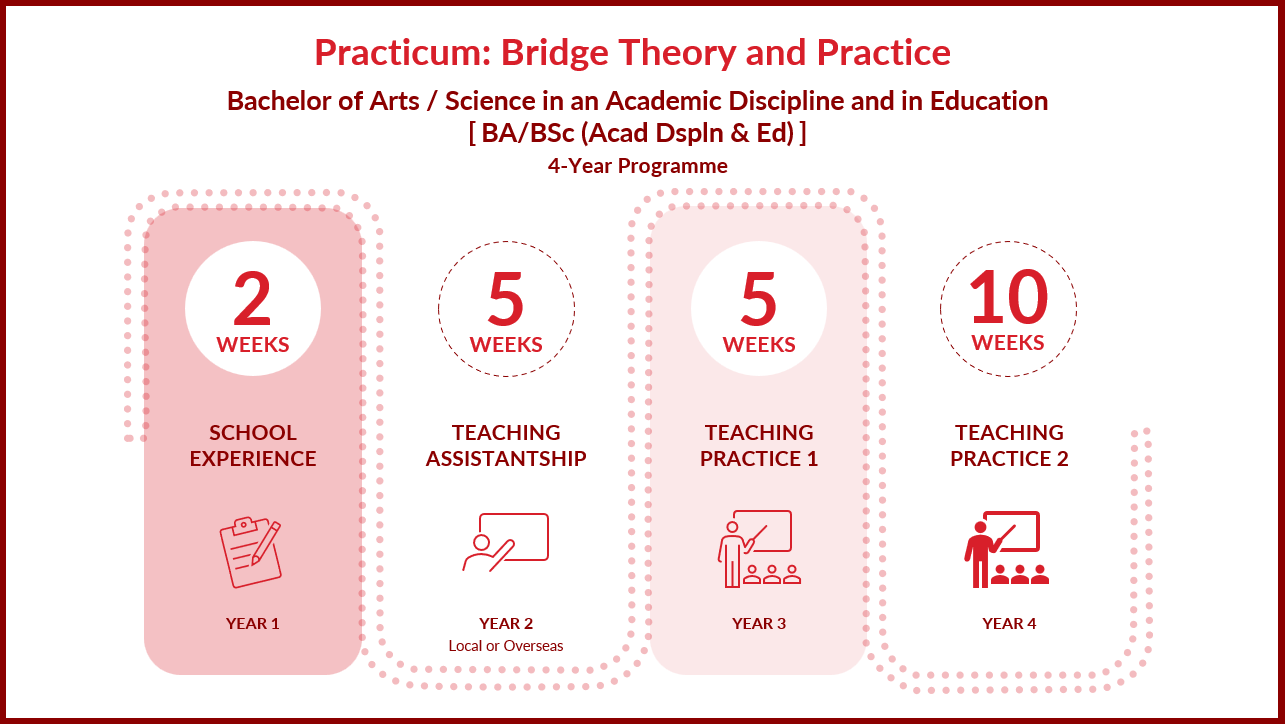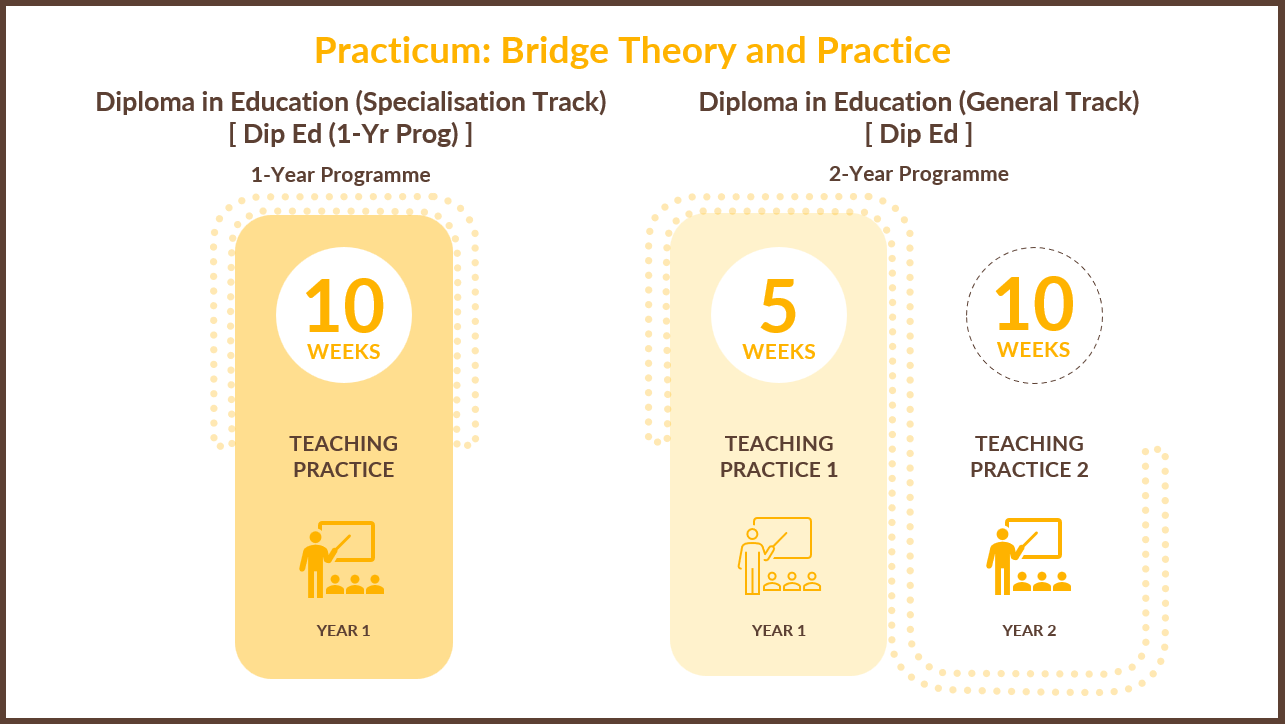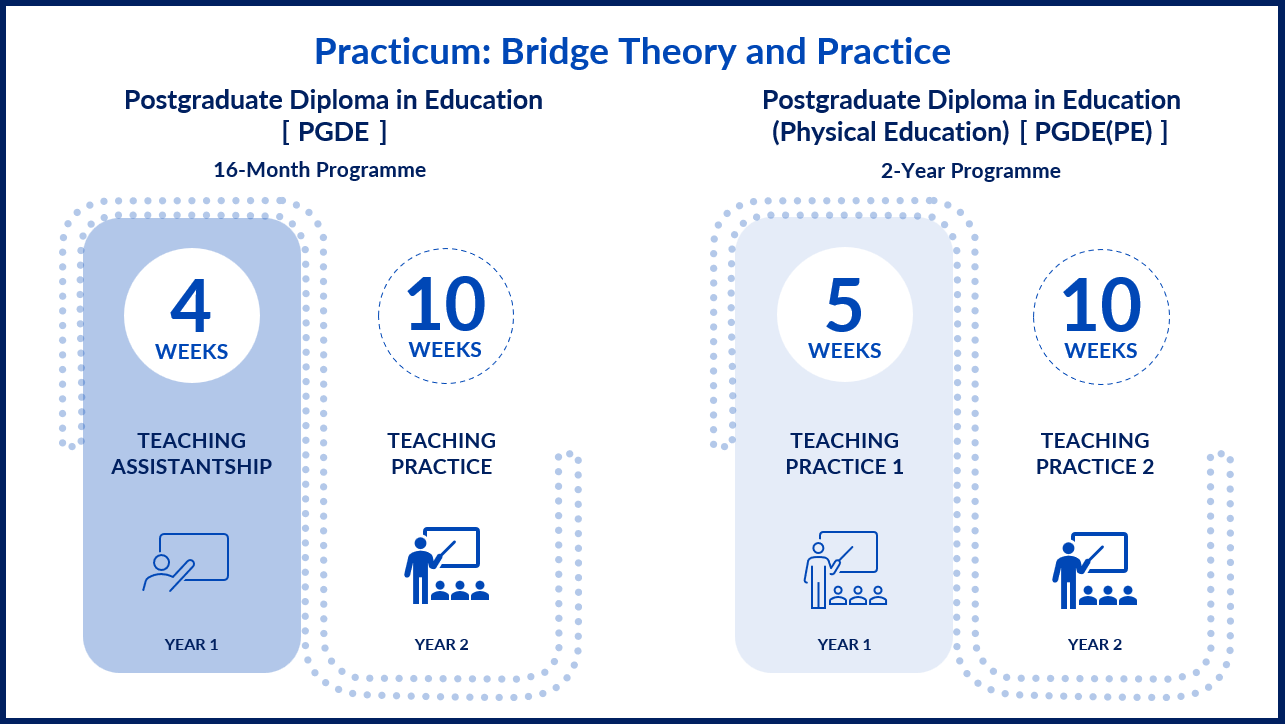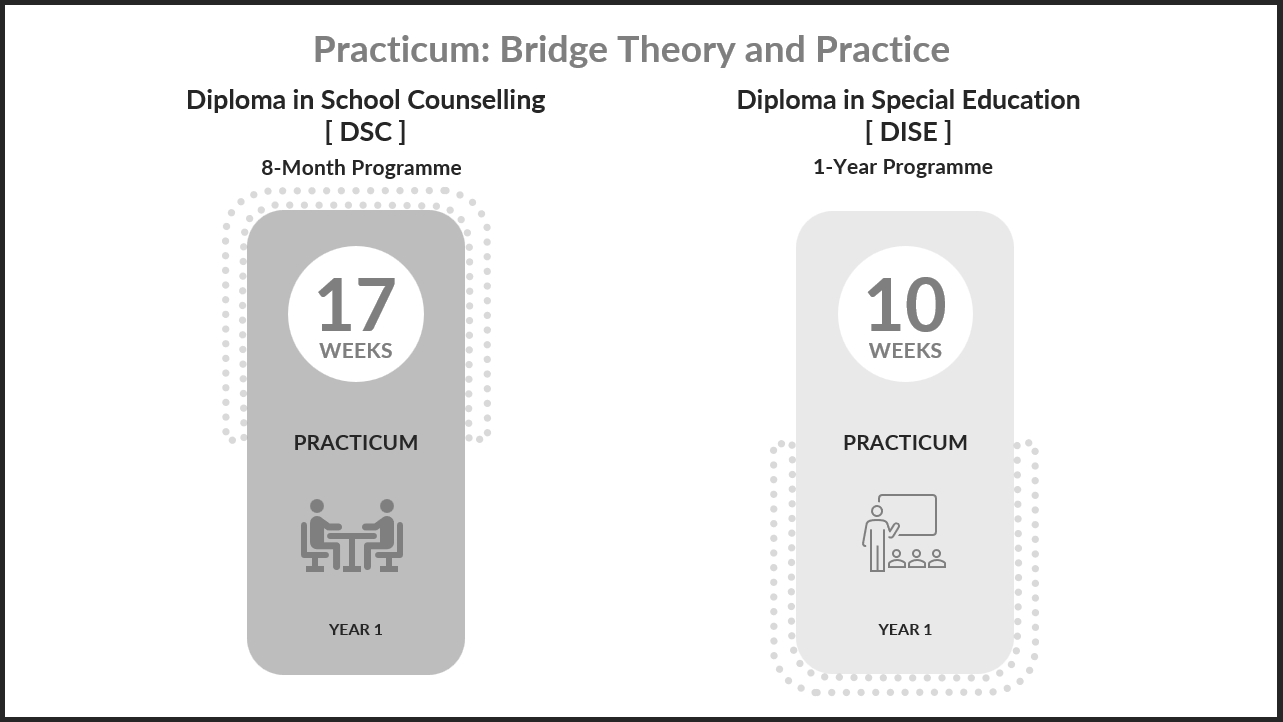INTRODUCTION
Developing Teaching Competence Through Practice
The practicum enables student teachers to acquire beginning teaching competencies and is a core component of the Initial Teacher Preparation programme in NIE. The purpose of the practicum is to help prepare student teachers for the realities of student teaching by providing them with a clear understanding of the contexts for schooling.
The practicum plays a major role in bridging “theory and practice” but beyond that, it offers the context for student teachers to develop their personal teaching competence (Smith and Lev-Ari, 2005, 291) and to acquire and develop the knowledge of teaching and professional content knowledge of teachers (Shulman, 1987). It is through the practicum experience that student teachers develop important professional knowledge such as knowledge of people, knowledge of themselves, self-control and inter-personal sensitivity - all of which are important traits that would see them through their professional lives (Eraut, 1988, cited in Yan & He, 2009). In addition, practicum teaches soft skills such as independent problem-solving, working collegially with fellow staff teachers and developing professional values and attitudes (Ramsden, 1992).
During practicum, student teachers are mentored and guided by their School Coordinating Mentors, Cooperating Teachers and NIE Supervisors through systematic observations, assistance and advice. They will have opportunities to become involved with, and actively participate in all aspects of the school’s activities. Through these experiences they will learn to link theory and practice, and to acquire the understanding and skills necessary for teaching effectively in a range of classroom situations.

References
Ramsden, P. (1992) Learning to Teach in Higher Education. London: Routledge.
Shulman, L. S. (1987). Knowledge as teaching: Foundations of the new reform. Harvard Educational Review, 57, 1–22.
Smith, K., & Lev-Ari, L. (2005). The place of the practicum in pre-service teacher education: The voice of the students. Asia-Pacific Journal of Teacher Education, 33, 3, 289–302.
Yan, C., & He, C. (2010) Transforming the existing model of teaching practicum: A study of Chinese EFL student teachers' perceptions. Journal of Education for Teaching, 36, 1, 57-73.
THE ENHANCED PARTNERSHIP MODEL
The robust partnership between NIE, MOE and schools is a key driver of NIE’s internationally recognised teacher education programmes. To strengthen the tripartite relationship along the whole continuum and reinforce the theory-practice nexus, NIE adopted an “Enhanced Partnership Model”.

The Enhanced Partnership Model provides the necessary collaborative framework of shared values and goals in the interest of teacher learning and education research, while recognising the need for mutual respect for each partner’s roles, beliefs, perspectives, experiences, expertise and knowledge. The NIE-Schools partnership is particularly significant in strengthening the theory-practice nexus. The theory-practice gap has been acknowledged as the main shortcoming of teacher education the world over, whether institutions or national agencies subscribe to the university-based or school-based models. Under the Enhanced Partnership Model, schools take on a bigger, more active role in practicum, school attachments and other in-situ collaborative platforms that facilitate professional development and bridge the gap between campus-based learning and ‘real classroom settings’.
Together with MOE, the strong tripartite relationship promotes solidarity of intentions and efforts to provide teachers with the best support in equipping them for their work in 21st century classrooms.
Adapted from “TE21: A Teacher Education Model for the 21st Century”
SELECTED NIE PUBLICATIONS
Journal Papers
Liu, W.C. Singapore’s approach to developing teachers: a foray into international teaching assistantship. Educ Res Policy Prac (2021). 🌐︎ Go to Website ✉ Email Woon-Chia LIU ⧉ DOI |
Liu, W.C. & Sitoe, C.Y. (2020) Student teachers’ psychological needs, subjective experience and perceived competence in teaching during practicum, Asia Pacific Journal of Education, 40:2, 154-166 🌐︎ Go to Website ✉ Email Woon-Chia LIU ⧉ DOI |
Book Chapters
| Liu, W. C. (2022). Clinical practice and teacher personhood. In W. C. Liu, Singapore's approach to developing teachers: Hindsight, insight, and foresight (pp. 134-152). London: Routledge. 🌐︎ Go to Website ✉ Email Woon-Chia LIU ⧉ DOI |
Liu, W. C. (2022). The tripartite partnership. In W. C. Liu, Singapore's approach to developing teachers: Hindsight, insight, and foresight (pp. 78-93). London: Routledge. 🌐︎ Go to Website ✉ Email Woon-Chia LIU ⧉ DOI |
Chua, B. L., Lee, Y. J., & Liu, W. C. (2018). The teaching practicum in Singapore: Developing teacher identity and professional practices. In K. J. Kenny & K. J. C. Lee (Eds.) Routledge international handbook of schools and schooling in Asia (pp. 912-921). London and New York: Routledge 🌐︎ Go to Website ✉ Email Woon-Chia LIU ⧉ DOI |
Png, L. H. J., & Liu, W. C. (2017). Mentoring and school partnerships. In O. S. Tan, W. C. Liu, & E. L. Low (Eds.), Teacher education in the 21st century: Singapore's evolution and innovation (pp. 217-232). Singapore: Springer. 🌐︎ Go to Website ✉ Email Woon-Chia LIU ⧉ DOI |
Liu, W. C., Tan, G. C. I., & Wong, A. F. L. (2017). Redesigning and reconceptualising of field experience for teacher accreditation. In O. S. Tan, W. C. Liu, & E. L. Low (Eds.), Teacher education in the 21st century: Singapore’s evolution and innovation (pp. 193-215). Singapore: Springer. 🌐︎ Go to Website ✉ Email Woon-Chia LIU ⧉ DOI |
Liu, W. C., Tan, G. C. I, & Salleh, H. (2014). Developing teacher competency through practice in Singapore. In J. Calvo de Mora & K. R. J. Wood (Eds.), Practical knowledge in teacher education: Approaches to teacher internship programs (pp. 109-126). Abingdon: Routledge. 🌐︎ Go to Website ✉ Email Woon-Chia LIU ⧉ DOI |
CONTACT US
Practicum
Practicum matters
Email: pract@nie.edu.sg






